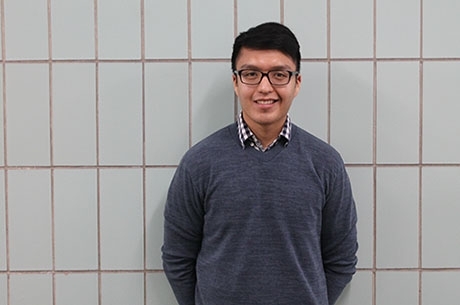
Most students count themselves lucky to earn even one highly-selective academic award, but Trevor Farland ‘17C has followed up his Jeannette K. Watson Fellowship with another coveted honor. He is one of 12 students around the country selected for the 2017 Native American Congressional Internship Program by the Morris K. Udall and Stewart L. Udall Foundation.
Since 1996, the Udall Internship has granted 245 interns representing 116 different tribes the unique opportunity to learn more about the federal government and its legislative process and to serve a non-partisan role in supporting policy development and public service, with an emphasis on environmental and Native American issues. The foundation also provides housing for interns in Washington, D.C. Farland will spend the 10 weeks of this summer internship supporting the work of Senator Tom Udall from New Mexico – the son of Stewart L. Udall – in his Washington office.
When Sara Nolfo, director of the Jeannette K. Watson program, suggested to Farland that he apply for the Udall internship, he hesitated at first. He wanted to diversify his government experience, and the Udall internship didn’t seem like a way for him to do that. But after doing some research on Stewart Udall, former U.S. Secretary of the Interior, Farland was intrigued. Udall’s advocacy for uranium miners and their family members exposed to radiation poisoning felt very close to home for Farland, who grew up on a Navajo reservation in northwest Arizona where uranium mining employed about a quarter of the population. His grandfather was a uranium miner who drank contaminated groundwater from the mine and brought home irradiated steel marbles for Farland’s mother to play with.
“I thought, this is definitely something I want to be part of,” said Farland. “After reading one of the essay questions on the application that asked, ‘what do you want to contribute back to your tribal group?’ I knew it was the right program for me.” Farland was one of only 16 finalists selected for an interview and when asked what his focus during the internship would be, his immediate response was “resource extraction on tribal lands.”
Farland is considering a future in research for public policy issues, but he is taking time to make up his mind about what he really wants to do. He knows he wants to work with tribal and Native American issues, but learned through his experience with Watson that there are a variety of ways to do so. “The Watson fellowship opened my eyes to a lot of different work fields across the non-profit, government, and for-profit sectors,” he said. “I realized that you don’t necessarily have to work for the federal government to address Native American issues.”
In addition to recommending the Udall internship to him, the Watson Foundation has nurtured his professional development. Nolfo helped him prepare his supplementary essays for Udall, and he benefited from application preparation workshops at the Watson offices. “The Watson Foundation creates a base for you,” he said. “They encourage you to reach back out to them even after your fellowship is over.”
Farland still has some time to decide where his career will lead him. He is in his fourth year of the combined Bachelor of Arts/Master of Arts (BA/MA) Government and Politics program at St. John’s, and is also completing a minor in anthropology. No matter what he ultimately decides, having these two prestigious awards under his belt will take him far.
“Trevor Farland represents the ideal of the liberal arts education,” said Konrad Tuchscherer, Ph.D., associate professor of history and one of Farland’s faculty mentors at St. John’s. “While at St. John’s he has pursued his interests across a wide range of subjects and disciplines ranging from government to literature, sociology, and history. His mentorship from a number of professors made an enormous impact on him. His J.K. Watson Fellowship experience not only enabled him to travel the world and engage in meaningful work and internships, but transformed him intellectually and personally.”
Related News
Q&A with Brenda Almendarez-De Bello ’06M.S.Ed., ’19Ed.D., LEAD Honoree
Brenda Almendarez-De Bello ’06M.S.Ed., ’19Ed.D., Principal of Tamarac Elementary School in the Sachem Central School District , will be among several alumni honored by The School of Education (SOE) at...
SOE Alumnus Honored by SAANYS
John Trotta ’26Ed.D., Assistant Principal at Polk Street Elementary School in the Franklin Square, NY, School District, was recently named 2026 New York State Elementary School Assistant Principal of...
The School of Education Celebrates Catholic Schools Week with Special Gift to Our Lady of Victory School
In celebration of Catholic Schools Week, The School of Education at St. John’s University donated 14 digital microscopes to Our Lady of Victory School in Mount Vernon, NY. Robert DiNardo, Director of...
